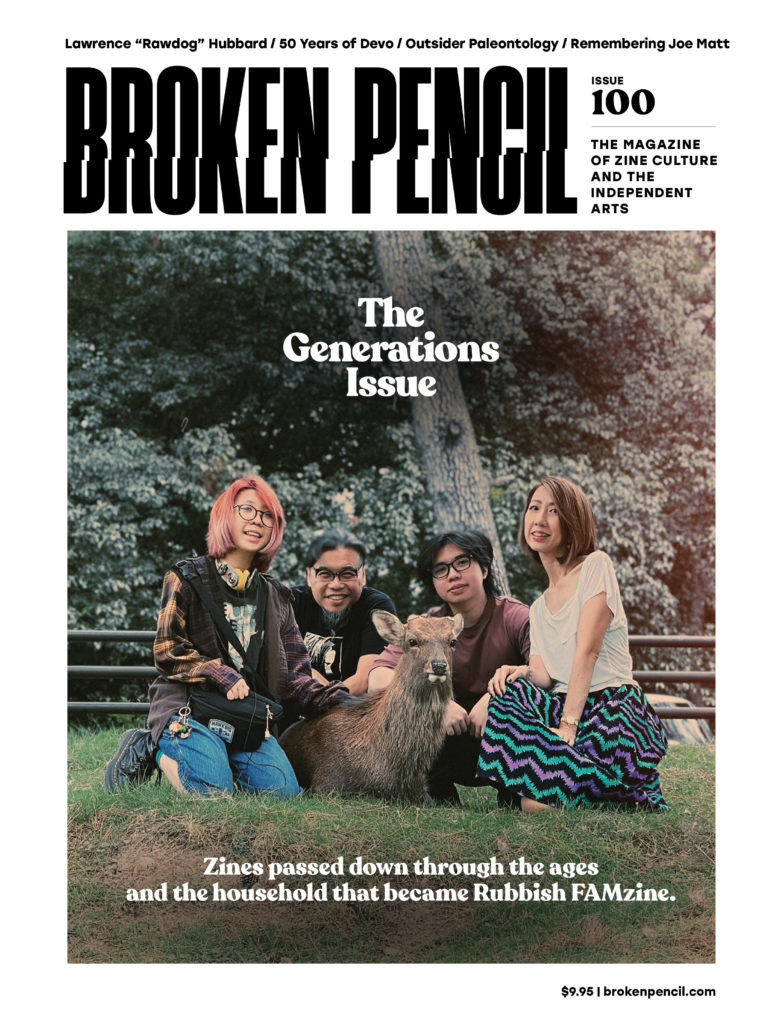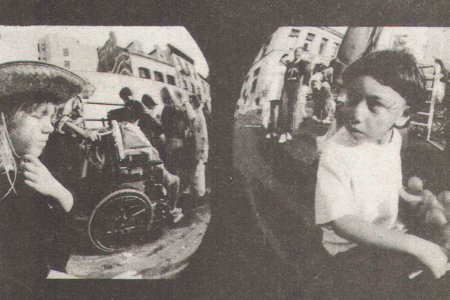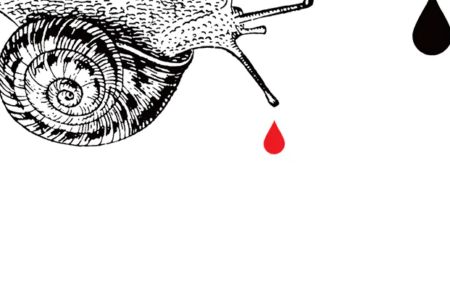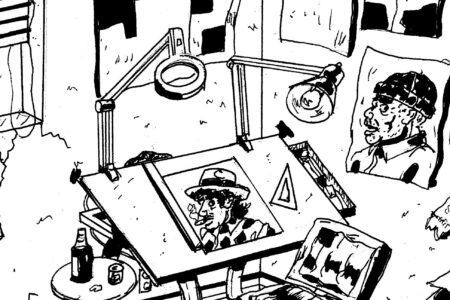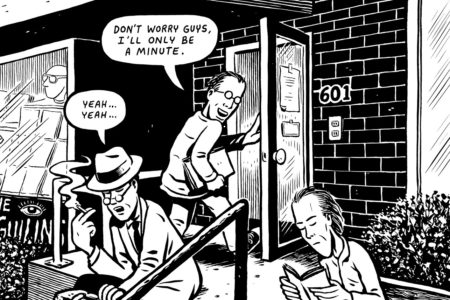Features
A Day with Matt Farley, The World’s Most Prolific Artist
I admire Matt Farley and what he represents. I predict that he will one day be recognized as one of the emblematic creatives of his era. For this reason, I travelled to Peabody, Massachusetts for the Motern Extravaganza, an annual concert and fan event Farley holds in his own honour.
Thunderous Feminism: The Legacy of the Northern Woman Journal
On printing day of the famed Thunder Bay feminist publication, one woman would type on an electric typewriter while volunteers spread the issue’s pages on the counters and stools of what was formerly a Finnish restaurant — still smelling of the fryer oil.
Trash and Treasure: The Holycrap Family on Zinemaking and Keepsaking
Their award-winning zine may have begun as a lighthearted family activity, but parents Pann and Claire Lim's are attempting to present Rubbish Famzine as something more enduring to their children: an heirloom.
The Tide Turns in Time
How Michael Novick and his street action political zine Turning the Tide evolved to put radical media in the hands of the people.
In the Beginning was the End: 50 Years of Devo
Like the oscillations on an energy dome, the de-evolution doctrine of some geeky Akron, Ohio punkers has echoed for generations, inspiring underground art scenes for most of a century. This is the story of art and Devo.
Hardcore in the Void: The Return of Anti-Matter
"There were definitely times where I thought, ‘I could really use a conversation with someone who’s just seen it all.’” Texas is the Reason's Norman Brannon discusses his reasons for reviving his '90s hardcore zine.
Review: Love Is A Place But You Cannot Live There
The human brain and its capacity to love have never been simple. Jade Wallace's poetry incites a lot of introspection into how we are connected to our environments in intimate ways, but not necessarily made loving by them.
Review: Feminism for a Genderqueer Generation
The way Melendez mixes theory with personal anecdotes is a graceful way to deliver intellectual critique with relatable humour. This is a strong, accessible read that even someone who might be hearing about “agender” for the first time can understand.
Review: Canada’s Place Names & How to Change Them
As Beck’s research shows, naming is a vital part of how we construct and interpret the world around us. Names can hold clues to the land and celebrate its people and stories; they can also be used to conceal what came before.
Review: Anxious
Anxiety, while a sometimes terrifying experience, can also be a place of self-discovery as it forces some into periods of self-reflection. There’s something wonderful that lurks in that space between our ears.
Art Holes: Rawdog
"I’m working on a big project I can crash for a few hours and then keep on banging out pages." Real Deal Comix' Lawrence Hubbard gives us a tour of his spartan digs.
Review: Biography of X
A tightrope walk of a novel, Catherine Lacey’s Biography of X deftly weaves speculative fiction and fact into a story about love and abuse, a relationship turned sour and the lengths one will go to for their art.
Review: Krello
A couple deal with an alien crash landing in their backyard in cartoonist Kanekiel's debut effort.
Paleontology For You And For Me: The Outsider Scientists Redrawing the Dinosaur
Scales, claws, fangs and (controversially) feathers. Meet the paleoartists and zines who believe the vision of dinosaurs belong to everyone who survived their extinction.
Review: Grunge Tejana
Bonnie Cisneros' zine is an all-inclusive haunting. A quintessential '90s love letter, Grunge Tejana sheds light on the brown folks who made up a big part of the grunge scene down here in Texas.
Review: Tegan and Sara: Modern Heartthrobs
Unlike many other acts who saw the quality of their music degenerate in inverse proportion to their pocketbooks, Tegan and Sara’s art has only increased in its popularity and reach. Melody Lau does an excellent job of highlighting these tensions.
Review: Sleepy Hollow Motor Inn
Molly Young breathes life into her tale of homicide, hemophilia, Cape Cod motels and underwater exploration. She brings a love of language, rigorous research approaches and a jovial reportage style reminiscent of a This American Life episode.
Review: Continuity Errors
Catriona Wright's poetry book is for millennials who are climate anxious, financially insecure and over-saturated with the dark humour of the internet.
Review: The Marigold
Equal parts Cronenberg and Ballard, the Toronto of Andrew F. Sullivan's satirical horror is most effectively unnerving when rendered from the vantage point of foundation pits, damp parking garages, fortress-like backyards and underground tunnels.
Review: but i digress
Our perspective on a past event can change over time given someone else’s account or our desires creeping in. Nestor Kok's photozine encapsulates our warped perspective through Chicago's infamous Bean.
First the Press, Then the Streets
In the early 1900s, Spain was at the forefront of the largest anarchist movement in history. According to James Yeoman, it would not have been possible without the underground press.
Review: Grace
Grace is an unflinching dive into the chronic pain of Holly English's maternal grandmother and how it affected three generations of her family. I expected the story to be about an attempt to heal, instead, it focuses on more of the medical system’s failures.
Review: Girlfriends
Emily Zhou’s stories have a nice edge to them. At their best, they’re tender and have a nice undercurrent of emotion. There’s a resonance in her 20-something protagonists fumbling around, learning the beats and trying to make a go of it.
Beyond the Machine: Analog Sea and Maintaining an Offline Collective
Analog Sea is a publication devoted to maintaining a small community of writers who wish to live offline in the digital age. They advocate for the human right to disconnect and have international stockists carry their bulletin for free-taking.
The Most Honest Artist in Town: Remembering Joe Matt
Joe Matt erased the line between what should and should not be shared with an audience, which in turn made the reader realize that perhaps they didn’t need to be so fearful of their own dark secrets.

